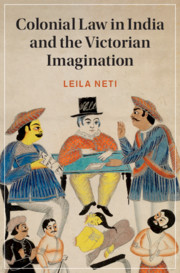Book contents
- Colonial Law in India and the Victorian Imagination
- Cambridge Studies in Nineteenth-Century Literature and Culture
- Colonial Law in India and the Victorian Imagination
- Copyright page
- Dedication
- Contents
- Acknowledgments
- Introduction
- Part I Criminality
- Chapter 1 “Power Able to Overawe Them All”
- Chapter 2 The Social Life of Crime
- Part II Temporality
- Part III Adoption and Inheritance
- Afterword
- Notes
- Bibliography
- Index
Chapter 1 - “Power Able to Overawe Them All”
Criminality and the Uses of Fear
from Part I - Criminality
Published online by Cambridge University Press: 02 April 2021
- Colonial Law in India and the Victorian Imagination
- Cambridge Studies in Nineteenth-Century Literature and Culture
- Colonial Law in India and the Victorian Imagination
- Copyright page
- Dedication
- Contents
- Acknowledgments
- Introduction
- Part I Criminality
- Chapter 1 “Power Able to Overawe Them All”
- Chapter 2 The Social Life of Crime
- Part II Temporality
- Part III Adoption and Inheritance
- Afterword
- Notes
- Bibliography
- Index
Summary
“’A Power Able to Overawe Them All’: Criminality and the Uses of Fear,” begins with a discussion of criminality in The Queen v. Eduljee Byramjee (1846). At the heart of the case was the question of whether criminal convictions could be appealed to the Privy Council. On the one hand, to limit appeals to the Queen would implicitly serve to undermine her absolute sovereignty. On the other hand, granting the right to appeal would undermine the authority of the colonial courts and intervene in the social, political, and economic uses to which Indian criminals were put. This chapter also shows how the fiction of Indian criminality became useful to the exercise of British sovereignty. As the last ready supply of working bodies after the abolition of slavery, and the end of British penal transport, Indian criminals provided essential physical labor for the territorial expansion of Empire. The rhetoric of Indian degeneracy, then, was central to both the ideological and material terms by which the British consolidated and expanded their sovereignty. (Word Count: 10,500)
Keywords
- Type
- Chapter
- Information
- Colonial Law in India and the Victorian Imagination , pp. 33 - 62Publisher: Cambridge University PressPrint publication year: 2021

